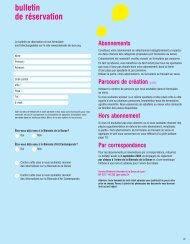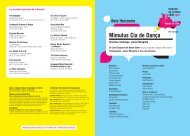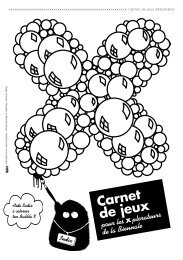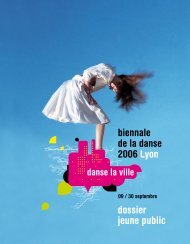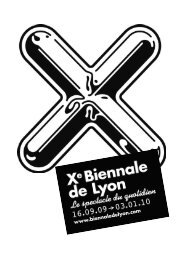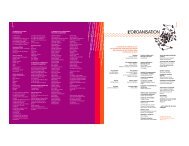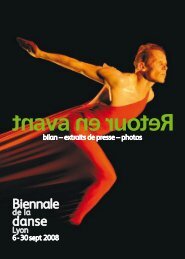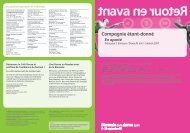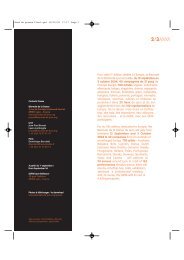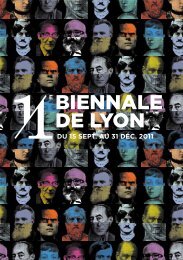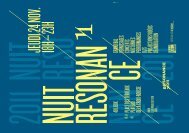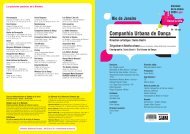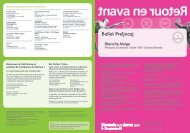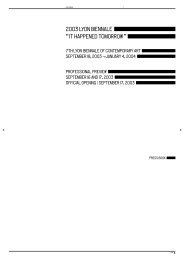Compagnie L’A.Loin…Solo - Création 2008Direction artistique, conception et interprétation : Rachid OuramdaneCréation musique : Alexandre MeyerVidéo : Aldo Lee - Lumières : Pierre Leb<strong>la</strong>nc - Costumes et maquil<strong>la</strong>ge : La Bourette - Décor, régie générale et son : Sylvain Girau<strong>de</strong>au - Assistante <strong>de</strong> réalisation : Erell Melscoët - Régievidéo : J<strong>en</strong>ny T<strong>en</strong>g - Régie lumières : Stéphane Graillet - Administration : Charlotte GiteauProduction : L’A. - Coproduction : Théâtre <strong>de</strong> <strong>la</strong> Ville <strong>de</strong> Paris, Bonlieu - Scène nationale d’Annecy, Bi<strong>en</strong>nale <strong>de</strong> <strong>la</strong> <strong>Danse</strong> <strong>de</strong> <strong>Lyon</strong> -Avec l’ai<strong>de</strong> <strong>de</strong> : Fanal, Scène nationale <strong>de</strong> Saint-Nazaire dans le cadre d’une résid<strong>en</strong>ce <strong>de</strong> création - Avec le souti<strong>en</strong> <strong>de</strong> : Culturesfrance, Won<strong>de</strong>rful district à Hô-Chi-Minh (Vietnam), Ambassa<strong>de</strong> <strong>de</strong><strong>France</strong> au Vietnam, L’Espace - C<strong>en</strong>tre culturel à Hanoï, Service <strong>de</strong> coopération et d’action culturelle à Hô-Chi-Minh - Subv<strong>en</strong>tionné par : DRAC Ile-<strong>de</strong>-<strong>France</strong>, Ministère <strong>de</strong> <strong>la</strong> culture et <strong>de</strong> <strong>la</strong> communication,Culturesfrance (projets à l’étranger) - Depuis 2007, Rachid Ouramdane est artiste associé au Théâtre 2 G<strong>en</strong>nevilliers - Accueil : CCN Rillieux-<strong>la</strong>-Pape, Bi<strong>en</strong>nale <strong>de</strong> <strong>la</strong> <strong>Danse</strong>CCN Rillieux-<strong>la</strong>-PapeMercredi 24 20h30Jeudi 25 20h30V<strong>en</strong>dredi 26 20h30Samedi 27 18h30Durée : 1hPlein tarif17 €Tarif réduit14 €Rachid OuramdaneL’A. fondée par Rachid Ouramdane, est unlieu <strong>de</strong> réflexion artistique sur les id<strong>en</strong>titéscontemporaines et qui p<strong>la</strong>ce <strong>la</strong> r<strong>en</strong>contre <strong>de</strong>l’autre au c<strong>en</strong>tre <strong>de</strong>s préoccupations.Ses projets s’attach<strong>en</strong>t au singulier. Chacune<strong>de</strong> ses pièces interroge <strong>la</strong> construction <strong>de</strong>saffects et <strong>de</strong>s imaginaires <strong>de</strong>s personnesqu’il r<strong>en</strong>contre. Elles se construis<strong>en</strong>t dansune découverte <strong>de</strong>s singu<strong>la</strong>rités <strong>de</strong> chacunoù le dialogue est à chaque fois posédifféremm<strong>en</strong>t. L’image vidéo, toujoursprés<strong>en</strong>te, est réfléchie comme une ext<strong>en</strong>sion<strong>de</strong> l’autre qui nous permet d’accé<strong>de</strong>r à sonespace m<strong>en</strong>tal. L’image crée un dialogue<strong>en</strong>tre <strong>la</strong> personne elle-même et ses doubles.L’utilisation <strong>de</strong> ces dispositifs est, pourRachid Ouramdane, un moy<strong>en</strong> d’atteindre<strong>la</strong> subjectivité <strong>de</strong> l’autre et son imaginaire.La construction <strong>de</strong>s id<strong>en</strong>tités contemporaines,<strong>en</strong> prise avec <strong>la</strong> mo<strong>de</strong>rnisation d<strong>en</strong>os sociétés et les reconfigurations opéréespar le bouleversem<strong>en</strong>t <strong>de</strong> nos géographiesculturelles, a fait l’objet <strong>de</strong> nombreuxprojets. Cette réflexion s’est particulièrem<strong>en</strong>tprécisée lors <strong>de</strong> l’é<strong>la</strong>boration <strong>en</strong> 2004du solo Les morts pudiques, sorte d’autoportraitconstruit à partir <strong>de</strong> fragm<strong>en</strong>tsd’histoires collectées sur le net. Ce solomarque le début d’une série <strong>de</strong> soli réalisésdans différ<strong>en</strong>tes pièces.Après plusieurs séjours <strong>de</strong> travail au Brésil,il crée, <strong>en</strong> 2005, Cover, pièce <strong>de</strong> quatresoli pour <strong>de</strong>s artistes brésili<strong>en</strong>s. Dans lemême temps, il développe un part<strong>en</strong>ariatimportant avec Bonlieu-Scène nationaled’Annecy et y prés<strong>en</strong>te <strong>la</strong> plupart <strong>de</strong> sescréations. En 2006, il crée Superstars pourle Ballet <strong>de</strong> l’Opéra National <strong>de</strong> <strong>Lyon</strong> etUn garçon <strong>de</strong>bout, un solo interprété parl’auteur et metteur <strong>en</strong> scène Pascal Rambert.Aujourd’hui, sur l’invitation <strong>de</strong> PascalRambert, Rachid Ouramdane est artisteassocié au CDN Théâtre <strong>de</strong> G<strong>en</strong>nevilliers. Autravers <strong>de</strong>s différ<strong>en</strong>ts projets qu’il propose, ilirrigue <strong>de</strong> ses questions sur l’id<strong>en</strong>tité le réel<strong>de</strong> <strong>la</strong> ville <strong>de</strong> G<strong>en</strong>nevilliers. Il y développeégalem<strong>en</strong>t <strong>en</strong> col<strong>la</strong>boration avec l’équipedu théâtre <strong>de</strong> nouvelles formes <strong>de</strong> r<strong>en</strong>contrespropres à chaque création tout <strong>en</strong> lesinscrivant dans le quotidi<strong>en</strong> <strong>de</strong> <strong>la</strong> ville. Ilcrée Surface <strong>de</strong> réparation pour huit jeunessportifs <strong>de</strong> G<strong>en</strong>nevilliers qui abor<strong>de</strong> le gestesportif pour <strong>en</strong> révéler <strong>la</strong> dim<strong>en</strong>sion intimequi lie ces adolesc<strong>en</strong>ts à leur pratique.Parallèlem<strong>en</strong>t à ses projets <strong>de</strong> création,Rachid Ouramdane développe un travaild’<strong>en</strong>seignem<strong>en</strong>t et est régulièrem<strong>en</strong>t invité<strong>en</strong> <strong>France</strong> et à l’étranger pour diriger <strong>de</strong>sateliers <strong>de</strong> recherche artistique et modérer<strong>de</strong>s r<strong>en</strong>contres d’artistes internationaux(Russie, Roumanie, Pays-Bas, Brésil,Etat-Unis...).Loin… / Création 2008Sur les traces <strong>de</strong> <strong>la</strong> guerre d’Indochine et <strong>de</strong>ses ravages id<strong>en</strong>titaires, le nouveau solo <strong>de</strong>Rachid Ouramdane s’imprègne <strong>de</strong> l’histoirepour mieux <strong>la</strong> réinv<strong>en</strong>ter. Mouvante,tortueuse, surpr<strong>en</strong>ante, <strong>la</strong> danse épouse leschangem<strong>en</strong>ts <strong>de</strong> l’homme <strong>en</strong> sondant le <strong>la</strong>byrintheobscur et lumineux <strong>de</strong> sa mémoire.« Le voyage est souv<strong>en</strong>t l’occasion <strong>de</strong> se revisiter,le mom<strong>en</strong>t pour faire le point sur sonid<strong>en</strong>tité ou plutôt nos id<strong>en</strong>tités. Celles donton hérite, que l’on porte dans le regard <strong>de</strong>l’autre et celles qu’on se projette, qu’ont<strong>en</strong>te d’émanciper. Qu’elle soit nationale,économique, ethnique, minoritaire, culturelle,médiatique, sexuelle, psychologique,affective : le voyage questionne ces stratesid<strong>en</strong>titaires qui se reconfigur<strong>en</strong>t lors <strong>de</strong> tousnos dép<strong>la</strong>cem<strong>en</strong>ts. Ces différ<strong>en</strong>ts visages d<strong>en</strong>ous-mêmes ont alors souv<strong>en</strong>t à négocier<strong>en</strong>tre l’héritage d’un passé et une id<strong>en</strong>titéqui se construit au prés<strong>en</strong>t. C’est lors <strong>de</strong>ces mouvem<strong>en</strong>ts qu’apparaît le s<strong>en</strong>tim<strong>en</strong>td’être ETRANGER. Nos différ<strong>en</strong>ces assuméeset notre méconnaissance <strong>de</strong> l’ailleurscré<strong>en</strong>t le lieu pour que notre regard puissese rep<strong>en</strong>ser. Ce carrefour <strong>de</strong> <strong>la</strong> p<strong>en</strong>sée estl’<strong>en</strong>droit autour duquel j’articulerai monprochain projet chorégraphique. Lors d’unréc<strong>en</strong>t voyage au Vietnam et au Cambodgem’est apparue une autre façon <strong>de</strong> creuserce s<strong>en</strong>tim<strong>en</strong>t d’être étranger. A l’occasiond’une discussion sur les viol<strong>en</strong>ces <strong>de</strong>s conflitsqui ont secoué ce pays, je me suis souv<strong>en</strong>u<strong>de</strong>s pages du carnet miliaire <strong>de</strong> mon pèrequi avait eu à fouler cette ex-Indochine. Aufur et à mesure <strong>de</strong> cette discussion, du fait<strong>de</strong> ma nationalité française, je voyais qu’onme donnait <strong>la</strong> p<strong>la</strong>ce d’un <strong>en</strong>fant d’anci<strong>en</strong>colon alors que ce qui liait mon père à cetteIndochine était l’héritage d’une autre colonisation,<strong>la</strong> si<strong>en</strong>ne, <strong>en</strong> Algérie.64
Comm<strong>en</strong>t <strong>la</strong> viol<strong>en</strong>ce <strong>de</strong>s conflits armés nousr<strong>en</strong>d-elle étranger ?Quelle s<strong>en</strong>sibilité naît <strong>de</strong> ces viol<strong>en</strong>ces ?C’est <strong>la</strong> question qu’abor<strong>de</strong>ra ce projet itinérantsuivant les pas d’un voyage effectué il ya plus <strong>de</strong> 50 ans. »Rachid OuramdaneInfo +Coproduction Bi<strong>en</strong>naleChorégraphe invité par le Ballet <strong>de</strong> l’Opéra<strong>de</strong> <strong>Lyon</strong> à l’occasion <strong>de</strong> <strong>la</strong> Bi<strong>en</strong>nale 2006Rachid OuramdaneRachid Ouramdane’s company L’A. is a forumfor artistic reflection on contemporary id<strong>en</strong>tities,and which accords c<strong>en</strong>tral importance to<strong>en</strong>countering the other.His projects focus on the singu<strong>la</strong>r. Each of hispieces explores the construction of the affectsand imaginative realms of people he meets.They are <strong>de</strong>veloped through discovering eachperson’s singu<strong>la</strong>rities; in each piece, dialogueis treated differ<strong>en</strong>tly. The ever-pres<strong>en</strong>t vi<strong>de</strong>ofootage is used as an ext<strong>en</strong>sion of the other, asa way into their mind. Images create a dialoguebetwe<strong>en</strong> the person and their doubles.Ouramdane uses these conceits to capturethe subjectivity and imaginative realm of theother. He has conducted many projects on howcontemporary id<strong>en</strong>tities are constructed amidthe mo<strong>de</strong>rnisation of our societies and amid thereconfigurations caused by the upheaval of ourcultural geographies. This exploration was giv<strong>en</strong>a particu<strong>la</strong>rly acute focus in the 2004 solo Lesmorts pudiques, a sort of self-portrait <strong>de</strong>visedfrom fragm<strong>en</strong>ts of stories gathered from theinternet. It marked the start of a series of solosin various pieces.In 2005, after several work stays in Brazil,Ouramdane created Cover, a four-solo piece forBrazilian artists. At the same time, he <strong>de</strong>velopeda major partnership with Bonlieu-Scène Nationaled’Annecy, <strong>France</strong>; he stages most of his newworks at this leading performing arts c<strong>en</strong>tre. In2006, he created Superstars for Ballet <strong>de</strong> l’OpéraNational <strong>de</strong> <strong>Lyon</strong>, and Un garçon <strong>de</strong>bout, a soloperformed by the writer and stage director PascalRambert. Curr<strong>en</strong>tly, at Rambert’s invitation,Ouramdane is associate artist at CDN Théâtre <strong>de</strong>G<strong>en</strong>nevilliers. Through the projects he <strong>de</strong>vises,he feeds his id<strong>en</strong>tity-re<strong>la</strong>ted questions into thereality of this Paris suburb; in addition, col<strong>la</strong>boratingwith the theatre’s team, he<strong>de</strong>velops new forms of <strong>en</strong>counterspecific to each new work, whilealso weaving them into the town’s everydaylife. He created Surface <strong>de</strong> réparationfor eight young sportspeople in G<strong>en</strong>nevilliers;the piece analyses the sporting gesture to revealits intimate dim<strong>en</strong>sion, which bonds these adolesc<strong>en</strong>tsto the sport they practise.In parallel with his creative work, RachidOuramdane is <strong>de</strong>veloping his teaching activities.He is regu<strong>la</strong>rly invited to lead artistic-researchworkshops and to mo<strong>de</strong>rate meetings betwe<strong>en</strong>international groups of artists in <strong>France</strong> and furtherafield (Russia, Romania, Nether<strong>la</strong>nds, Brazil,United States, etc.).Loin… / 2008 creationRachid Ouramdane’s <strong>la</strong>test solo explores thetraces of the Indochina war and the havoc itwreaked on id<strong>en</strong>tities; it soaks up history tobetter reinv<strong>en</strong>t it. The dance – shifting, tortuous,surprising – shadows the changes peopleun<strong>de</strong>rw<strong>en</strong>t, reaching <strong>de</strong>ep into the dark andluminous <strong>la</strong>byrinth of memory.“Travelling oft<strong>en</strong> provi<strong>de</strong>s opportunities to revisitoneself, to take stock of one’s id<strong>en</strong>tity – or id<strong>en</strong>tities,rather. Those that we inherit, and informhow we see others; and those that we project toourselves, and try to liberate. Travel helps explorethe strata of id<strong>en</strong>tity – whether national, economic,ethnic, minority, cultural, media, sexual,psychological or affective – which are rearrange<strong>de</strong>very time we go on a journey. Our various facesmust therefore oft<strong>en</strong> negotiate betwe<strong>en</strong> the legacyof the past and an id<strong>en</strong>tity being constructedin the pres<strong>en</strong>t. During these movem<strong>en</strong>ts, thes<strong>en</strong>se of being a foreigner arises. Our embraceddiffer<strong>en</strong>ces and scant knowledge of elsewherecreate a p<strong>la</strong>ce where we can rethink ourperspective. My next choreographic project willrevolve around this crossroads of thought. On arec<strong>en</strong>t trip to Vietnam and Cambodia, anotherway of probing this s<strong>en</strong>se of foreignness occurredto me. While discussing the viol<strong>en</strong>ce andconflict that shook the region, I recalled pagesfrom my father’s military papers – he had operatedin what was th<strong>en</strong> Indochina. During thediscussion I realised that, because of my Fr<strong>en</strong>chnationality, I was se<strong>en</strong> as a child of a former coloniser,whereas my father’s bond with Indochina<strong>de</strong>rived from the legacy of another colonisation– by <strong>France</strong> in my father’s native Algeria.How does the viol<strong>en</strong>ce of armed conflict makeus foreign?What s<strong>en</strong>sibility does this viol<strong>en</strong>ce yield?These are the questions addressed in this travellingproject, which retraces a journey ma<strong>de</strong> morethan fifty years ago.”Extra info:Co-produced by the Bi<strong>en</strong>naleOuramdane was Ballet <strong>de</strong> l’Opéra <strong>de</strong> <strong>Lyon</strong>’sguest choreographer at the 2006 Bi<strong>en</strong>nale65



